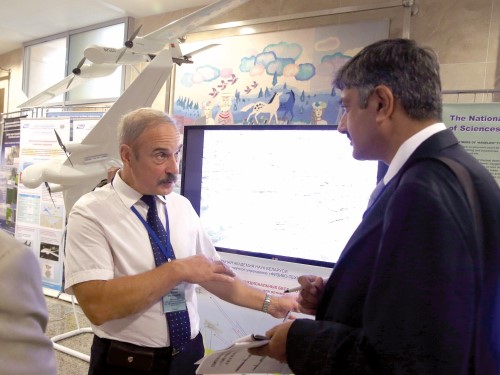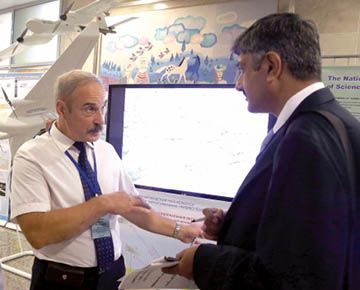
Belarus presents around 150 sci-tech developments at Business Forum
The first acquaintances and business circle contacts, made during the May visit by Alexander Lukashenko, centred around a business forum in Islamabad. This set a record for its weighty portfolio of agreements and contracts — worth over $50m — within just two days. It seems incredible but, a couple of years ago, annual trade turnover between our two states met this figure.
Current business meetings in Minsk were no less useful but it’s still too early to speak about results in monetary terms. However, the Chairman of the Belarusian Chamber of Commerce and Industry, Mikhail Myatlikov, supposes that the figure set in Islamabad will be exceeded.
The President of Belarus has announced, “We have the conditions necessary to expand our level of trade-economic and investment co-operation. I’ve been modestly proposed that we double our turnover within the next 2-3 years. Should we go round in circles? Is $100m a worthy turnover for our economies? We need to set a target of increasing mutual trade to $1bn. Our mutual interests are wide-ranging: from agriculture and machine building to the food industry, pharmaceuticals and biotechnologies. Pakistan’s economy is oriented towards the agrarian sphere, with almost half of the country’s population involved in agriculture. We have much to offer to this market, including tractors and potash fertilisers. Moreover, MTZ is ready to shift from sales of ready-made machinery to the supply of SKD kits for tractors. This will be the first step towards establishing assembly production of agricultural machinery in Pakistan. Alongside MTZ, other enterprises in the spheres of machine building, petrochemistry and timber processing plan to expand their presence on the Pakistani market.” Mountains occupy a large part of Pakistan’s territory and the country boasts deposits of oil, gas, coal, and ferrous and non-ferrous metals. Accordingly, Belarusian geologists are proposing collaboration in the development of mineral deposits, notes the Deputy Chairman of the Belarusian Chamber of Commerce and Industry, Vladimir Ulakhovich.
A true breakthrough is also expected in the export of food produce. In particular, a contract has been signed for $10m of dried milk, for supply to Pakistan. Belarusian cheeses, meat and bread products could all soon find their way onto Pakistan’s shelves, while our partner is ready to increase its export supply of rice, fruits and vegetables. Pakistan also has a strong textile industry, accounting for 10 percent of the world’s cotton market; it boasts 300 textile factories.
During an informal chat with journalists, the Co-Chairman of the Belarus-Pakistan Business Council, Tariq Khalil, showed off his suit, made of high quality wool. He noted that Pakistan is ready to supply such raw materials in major quantities to Belarus and to launch a joint textile enterprise in our country. The idea would be to supply the Eurasian and European markets. A joint venture to produce carpets (made from raw materials from Pakistan) at Brest Carpet Factory also seems promising.
Scientific interaction could prove profitable too. Accordingly, Mr. Lukashenko has invited representatives of Pakistani business circles to survey potential at the innovative Great Stone Industrial Park (currently under construction): designed to unite the spheres of pharmaceuticals, IT and communications.
The President outlined the advantages of bilateral co-operation, saying, “Pakistan may become a window to South Asia for Belarus, just as Belarus may become a window to Europe for Pakistan. Opening enterprises in Belarus will provide unlimited access to the Eurasian Economic Union markets while enabling promotion of goods and joint products to the European Union market.”
Pakistan’s scientists and businessmen are now analysing proposals from Belarusian colleagues. Around 150 sci-tech developments were presented at the National Library, with the Chemistry Institute showing its unique materials for 3D printing (used to create an artificial kidney). Innovative developments relating to water and air purification are sure to be useful in Pakistan’s hot climate while technologies in the sphere of optoelectronic systems, lasers and pilotless aircraft are also of interest. Contracts have been signed, including jointly with Adani: its Director General, Vladimir Linev, tells us that high-tech security provision systems are to be made in Pakistan.
Of course, Pakistan is a relatively new country, with huge global economic potential. It’s vital that Belarus create the right conditions to support businesses in their joint work and in fulfilling contracts, on either territory. Mr. Lukashenko has given such guarantees to Pakistani entrepreneurs and assured them that they won’t have any problems in our country. His word is his bond. Meanwhile, Pakistani PM Nawaz Sharif again stressed that Pakistan highly appreciates its relations with Belarus, and values Alexander Lukashenko’s personal work in cementing this partnership.
The current visit of the Pakistani PM has outlined priorities of interaction between our two states while laying the foundation for our economies’ rapprochement. Both sides have agreed, this autumn, to set out a ‘roadmap’ of development for our relations at governmental level, guiding us for the years to come.
By Alexander Pimenov
Photo: BELTA
Photo: BELTA












